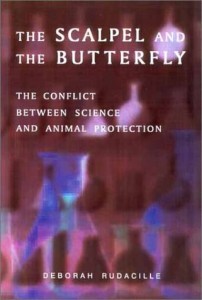
Author: Deborah Rudacille
Publisher: Farrar, Straus and Giroux, 2000
The heart of a pig may soon beat in a human chest. Sheep, cattle, and mice have been cloned. Slowly but inexorably scientists are learning how to transfer tissues, organs, and DNA between species. Some think this research is moving too far, too fast, without adequate discussion of possible consequences: Is it ethical to breed animals for spare parts? When does the cost in animal life and suffering outweigh the potential benefit to humans?
In precise and elegant prose, The Scalpel and the Butterfly explores the ongoing struggle between the promise offered by new research and the anxiety about safety and ethical implications in the context of the conflict between experimental medicine and animal protection that dates back to the mid-nineteenth century. Deborah Rudacille offers a compelling and cogent look at the history of this divisive topic, from the days of Louis Pasteur and the founding of organized antivivisection in England to the Nazi embrace of eugenics, from animal rights to the continuing war between PETA and biomedical researchers, and the latest developments in replacing, reducing, and refining animal use for research and testing.
Reviews“In this cautious, useful survey, Rudacille, a former writer and editor at the Johns Hopkins Center for Alternatives to Animal Testing, seeks a middle ground between biomedical researchers who defend animal experimentation as a necessary trade-off for potential benefits to humankind, and animal rights activists who would abolish such research” (Publishers Weekly)
“An absorbing analysis of issues that will dominate 21st-century biomedical science as technology steams full-speed ahead, leaving major moral issues in its wake” (Kirkus Reviews)
“In her engaged and illuminating study of these clashing sensibilities, Rudacille ponders troubling questions. Does an elevation in the moral status of animals, she asks, necessarily mean degradation in the moral status of human beings? (Certainly, she responds, this appears to have been the case under Nazi Germany.) Is the killing of laboratory animals–nearly 10,000 in the case of the Salk vaccine against polio–justifiable in the face of the human lives that can be saved? Is it ethical to use the mentally ill as research subjects in studies that may yield cures for their illness? Philosophical landmines surround every attempt at an answer, and Rudacille takes pains to consider all sides of these and kindred issues. Her thoughtful work should provoke reflection and discussion” (Gregory McNamee, AMAZON)
“Rudacille uses impeccably researched material to take readers from the earliest days of animal-rights activism to the present . . . an ambitious goal” (Rebecca Skloot, Chicago Tribune)